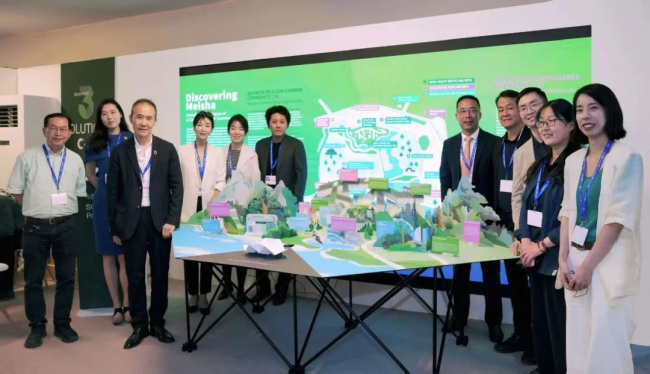Chinese solutions advance global climate action at COP28


At the recently-concluded 28th session of the Conference of the Parties to the United Nations Framework Convention on Climate Change, or COP28, in Dubai, United Arab Emirates, Chinese enterprises, experts and non-governmental organizations actively exchanged opinions with participants from all over the world on a variety of related topics.
The conference unprecedentedly took stock of the world's progress on the Paris Agreement, and charted the future course of global climate action. Side events and exhibitions at the event, which ran from Nov 30 to Dec 13, took place in the China Pavilion, which showcased the country's sustainable and aspiring climate solutions.
"NGOs have been playing a significant role in popularizing climate-related knowledge among the public, since elevated public awareness and engagement deliver climate solutions fundamentally," said Xie Xiaohui, secretary-general of the Vanke Foundation, at a side event hosted by the organization on Dec 11. With the theme of tackling global climate change with community actions, this event showcased several outstanding examples of public mobilization over the issue of climate action in China.
A series of action plans and reports were released during the event and notably, a near-zero carbon community in Southeast China's Shenzhen was included in a case study. The practice of building a carbon-neutral community in Yantian's Meisha Subdistrict, initiated by the Vanke Foundation, was one of the pilot programs that contributed to broadening public involvement in this instance.
Zhao Huaijun, head of the administrative services department of the Palace Museum in Beijing, shared his experience in expanding public engagement in the museum's zero-waste campaign. In his speech, which centered on building a green Palace Museum, Zhao described the project as an attempt by China's cultural and tourism industry to tackle challenges brought about by climate change, an initiative that has seen about 21 million visitors join in with the activity over the past four years.
Besides NGOs, corporate engagement is also seen as an important complementary approach to public involvement in climate change response.
"Low-carbon revolutions and innovations are pressing for all sectors of society, especially for the business sector," said Xie Zhenhua, China's special envoy for climate change, emphasizing the importance of corporate engagement in climate action while attending a side meeting for businesses at the China Pavilion.
Xie suggested that although China's installed renewable energy capacity had reached 1.213 billion kW by the end of 2022, technological upgrades in relevant industries should be prioritized to further improve energy efficiency, an area where Chinese companies have a huge role to play.
"Chinese entrepreneurs have been driving green transitions in terms of production, operations and supply chains since China has pledged to peak carbon emissions before 2030 and reach carbon neutrality before 2060," said Su Wei, China's chief climate negotiator.
Wang Shi, founder of the Vanke Group and chairman of the Vanke Foundation, said the innovative, pioneering, and transformative spirit of entrepreneurs could create a closed-loop cycle in business, which would produce pro-environment benefits.
"90 entrepreneurs spoke at the China Pavilion at COP28, compared to merely 20 last year. This reflected Chinese entrepreneurs' increasing involvement in global climate action," Wang said.
- Gen-Z Taiwan volunteer joins Minqin's desert afforestation efforts
- Over 20 Gen Z foreign guests to explore Baise city in Guangxi
- Japanese prime minister criticized over provocative Taiwan remarks
- Beijing's air quality improves further
- Lancang-Mekong countries vow to target telecom and cyber fraud
- China slams Japanese leader for refusing to withdraw her remarks




































